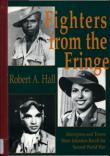Author's note: 'I had interviewed a number of Aboriginal and Islander ex-servicemen and women during my research for [my previous book] The Black Diggers and these taped interviews presented the ideal opportunity to have these black diggers describe their military service in their own words.
I have selected six interviews which reveal the range of Aboriginal and Islander experiences of military service in the war...In presenting these stories here, I have provided a brief review of the history of the Aboriginal and Islander involvement in the Second World War so that the stories can be seen in context. I have provided explanatory comments when I felt these were required but, as far as possible, I have left their stories exactly as they were told to me. Some rearrangement of blocks of text, to fit wide-ranging conversations into a proper chronological order, has been necessary, and occasional military jargon has been explained. But otherwise the following chapters recall the memories of these fighters from the fringe in their own words.' (Source: Preface)
 4375446843761720791.png
4375446843761720791.png
 Fighters from the Fringe : Aborigines and Torres Strait Islanders Recall the Second World War
selected work
war literature
Fighters from the Fringe : Aborigines and Torres Strait Islanders Recall the Second World War
selected work
war literature

